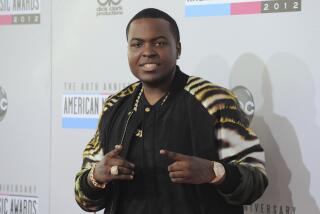2 Founders to Buy Back Stake in O.C.’s Kingston
- Share via
The founders of Kingston Technology Corp., who became multimillionaires when they sold a large chunk of the Fountain Valley memory chip maker and shared the windfall with workers, said Wednesday that they are using cash proceeds from the 1996 sale to buy back their company--for a third of the original price.
John Tu and David Sun said they will repurchase the 80% of Kingston from Japanese conglomerate Softbank Corp. for $450 million. The pair sold the stake in Kingston to Softbank three years ago for $1.5 billion in cash and stock. Tu and Sun still own 4.7 million Softbank shares, which are worth $1.23 billion.
The 1996 deal cast a global spotlight on the two engineers from Taiwan, whose unorthodox and benevolent way of doing business made their employees the envy of workers everywhere. Sun and Tu set aside $100 million to share with Kingston’s roughly 450 employees, who received a third payout from the bonus fund this month. The company was flooded with resumes by job-seekers from around the world, and employees were peppered with calls from salespeople.
A year later, in a remarkable display of corporate fealty, the two men agreed to forgo the final $333 million that Softbank owed them for the Kingston sale. Instead, Tu and Sun reworked the terms of the acquisition--without a contractual obligation to do so--because Kingston’s earnings failed to meet expectations.
Tu said the buyback has been in the works for more than a year and is set to close in the next couple of weeks. The deal reflects both an industrywide slump in the demand and price of the memory products that Kingston makes, and Softbank’s interest in focusing on Internet companies, according to Tu.
Although privately held Kingston doesn’t disclose sales and profit figures, industry analysts said the company is still profitable even though it has been hurt by the slump.
“David [Sun] and I should be able to pull the cash together,” Tu said. “[Softbank] could have gone out and found another buyer, but they didn’t. They came to us. . . . And it’s our responsibility to our employees to make sure someone else doesn’t come in here to take control.”
Softbank officials couldn’t be reached for comment. The Japanese company’s maneuvering in buying the Kingston stake three years ago--and selling it now--appears ill-timed, said George Iwanyc, an analyst with Dataquest.
“They purchased Kingston near the top of the last peak and at that point memory really did look very promising,” Iwanyc said. “Since then, the industry has suffered a collapse, probably steeper than they’ve expected.”
Now, the traditionally cyclical industry is poised for a rebound, and Softbank is selling.
Kingston, an industry leader with annual sales of $1.1 billion and a worldwide staff of 1,200, must invest in manufacturing infrastructure and distribution in order to grow, Tu said.
Such investments, as well as the memory market overall, fall outside of Softbank’s core business focus and strategy.
“This is three years later, and both [companies] have changed,” said Tu, 58, Kingston’s chief executive. “We had some concerns about not fitting into Softbank’s Internet umbrella, and our focus on manufacturing is not their cup of tea.”
It is unusual for one company to sell another company back to its original owner, but the turnaround in Kingston’s case is particularly rare, said Patrick Arrington, an attorney in mergers and acquisitions at Brobeck, Phleger & Harrison, a law firm that specializes in technology companies.
“This is unusually fast for a buyer to give up on a unit when it had paid such a handsome price for it, but this is a space that has moved very quickly, and the memory market is notoriously volatile,” Arrington said.
Because the information technology industry has moved so quickly, Softbank has been forced to shift strategies with equal speed, prompting the move, Arrington said.
The problem could be boiled down to four words, said Sherry Garber, an analyst with Semico Research Corp. in Phoenix: “There was no synergy.”
From the beginning, Garber said, it was unclear how Kingston would fit into Softbank’s overall portfolio, which now ranges from investments in Internet companies such as Yahoo Inc. and Onsale Inc. to ownership of Ziff-Davis Inc. and Comdex, the annual computer trade show.
Softbank’s buying spree started in the mid-90s, when the booming Japanese company announced its dreams of staking a claim to the infrastructure of the personal-computer industry. Softbank paid for its many acquisitions by issuing new stock, selling bonds backed by its rising share price, and targeting profitable U.S. companies.
But Softbank has narrowed its range in the past couple of years, analysts said. Masayoshi Son, Softbank’s founder and president, has invested $1.7 billion in more than 100 Internet companies. In addition, Softbank and its venture capital arm have sunk $906 million into eight Internet firms that have gone public, an investment that industry experts say is worth almost $14 billion.
Softbank officials recently announced plans to become a pure holding company in Japan to better focus on “maximizing shareholder value.”
Among other things, Kingston supplies memory products to major PC manufacturers, and memory boards that boost performance of older machines.
Garber predicted that the memory module market will grow about 30% annually over the next four years, driven by demand for memory that has outstripped even demand for personal computers.
Tu said he and Sun will consider giving workers Kingston stock instead of the cash bonuses, once the buyback is complete.
Joked Tu: “Right now, I’m telling everyone to save their bonuses. If this doesn’t work out, I may have to borrow some money from you.”
(BEGIN TEXT OF INFOBOX / INFOGRAPHIC)
Sharing the Wealth
Three years after first selling a stake of Kingston Technology Corp., co-founders David Sun and John Tu are still up at least $1.4 billion. Here’s a look at the company and how they created the good fortune and shared with their employees:
Kingston Technology Corp
Headquarters: Fountain Valley
Employees: 1,200
Founded: 1987
1998 sales: $1.1 billion
Product: Computer memory devices
Founders:
* John Tu, 58, chief executive
* David Sun, 48, vice president, engineering
How They Did It
1996
September: Tu and Sun sell 80% of Kingston to Softbank for $1.5 billion, $1.1 billion cash and 4 million Softbank shares worth $425 million.
December: $100 million bonus fund established to share sale proceeds with employees.
1997
January: First bonuses, totaling $38 million, distributed to Kingston employees.
October: Final $333 million Softbank owes as part of the deal is forgiven after industry heads into a slump.
1998
July/August: Second round of bonuses, $20 million, distributed as memory-products industry hits an all-time low.
1999
July:
* Third round of bonuses, $20 million.
* Tu and Sun Buy back 80% stake from Softbank for $450 million; meanwhile value of their shares grows to $1.23 billion.
Sources: Kingston Technology, Times reports






